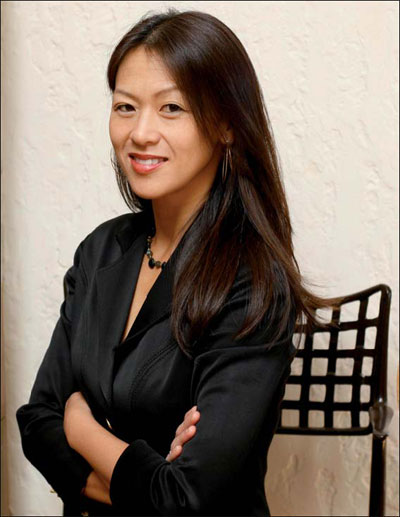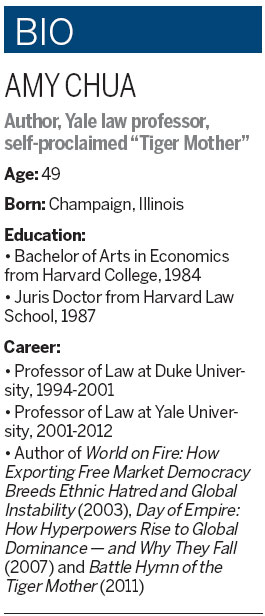Tiger Mother says satirical message of book fell flat
Updated: 2012-04-20 07:57
By Kelly Chung Dawson (China Daily)
|
|||||||||||
|
"Tiger Mother" Amy Chua plans to address the parenting issue further in her next book. Provided by the Chua Family |
Author wishes she offered more on ties with daughters
When The Wall Street Journal published an excerpt of Amy Chua's book Battle Hymn of the Tiger Mother last year under the headline "Why Chinese mothers are superior", the media uproar made Chua both famous and infamous.
The subject ignited passions, with Western parents and experts rushing to defend their parenting style with nods to the Western tradition of creativity and innovation; others pointed to China's economic success as a warning that stricter parenting might be needed to ensure the success of future generations of Western children.
But for Chua, the media storm was a lesson in how a provocative title (she makes no claim as to what style of parenting may be superior, she says) combined with economic anxiety may serve to make a joke fall really flat, she says.
"So many people misunderstood the message of Battle Hymn," Chua says. "The book was meant to be satirical. But I think the worst thing about the parenting debate is that people boil it down to black and white: Do you want creativity for your kids, or do you want self-discipline? It's such a stupid question, because obviously you want both. You cannot invent the theory of relativity without learning how to multiply."
In person, the "Tiger Mother" is diminutive in stature but enormous in presence. She is funny and warm, and after dozens of interviews, comfortable with media attention. This ease with which she articulates her point of view came in handy throughout last year's publicity blitz, as she fielded interviews with Charlie Rose, NBC's Today Show and CNN, among others. She was also named one of Time magazine's 100 Most Influential People in 2011.
In hindsight, Chua wishes the book had included more details about the softer side of her relationship with her daughters.
"But I wanted the book to be unusual; I didn't want it to be sentimental."
Another lesson in media management came with the marketing of her book for Chinese audiences, she says. In China the book was retitled Parenting Guide by a Yale Law Professor: Raising Kids in America.
"The title of the Chinese version was ridiculous," she says. "I tried to explain to my Chinese audiences about my sister getting leukemia, about learning life lessons, but hands immediately went up. They all asked, 'How do I get my kids into Harvard'?"
In fact, the advice she would give Chinese parents is the opposite to what she has advocated in the US.
"In China, there are too few choices for kids," she says. "There's only one way to succeed. One great thing about the American system is that there are so many different ways to be successful in high school. You can be captain of the football team, you can start an environmental club, you can do community service. You can be successful in a hundred different ways. In Asia, it's still 'Who's the best student?' It creates so much intensive pressure and competition. You have three happy people and 900 miserable ones. That is somewhere where China can learn from the Western system, to consider other ways of being successful."
The Chinese examination system and education structure is starting to undergo change, Chua says.
|
|
"I think they are trying to change (the system), but institutionally it is very hard. It is amazing in America that Mark Zuckerberg, Steve Jobs and Bill Gates all dropped out of college. In China, education is one of the few fair ways you can fight to the top. In China, mothers would say, 'I want my kids to have fun, but unfortunately they have to drill violin or their studies'."
For parents raising kids in the US, Chua stands by the original message of her book - which was not, as many critics believe, to love your children less if they fail, but instead to simply push them to fulfill their potential. And in the case of Lulu, the more rebellious of Chua's two daughters, to be open to change when necessary.
"To me it comes down to, 'pay attention to the individual personalities of your kids,'" she says. "I had to adjust. But I do think that it is about believing in your child, and teaching them that they are more capable than they think. I think Westerners give up too quickly. Their kids say, 'I hate math', and their parents say, 'don't worry. Go try something else'. When my daughters come home with a 96, I say 'great job, but let's take a look at those missing four points'."
She will have another chance to address the issue in her next book, which will expand on the subject of parenting to include other cultures, she says. She is working on the book with her husband Jed Rubenfeld, and is on leave from her teaching position at Yale Law School.
As the child of ethnic Chinese who migrated to the US from the Philippines, Chua recalls feeling like an outsider growing up in Champaign, Illinois.
"I was Chinese, fat, short, and I wore glasses and braces. And because my parents were poor I had really ugly clothes. But we all make our choices. I have always tried to convert this feeling of being an outsider into strength. I am not a whiner, or a victim. "
All three books she has written have had this world view, she says. World on Fire, her first book, focused on small minorities who have been persecuted as a result of their success. Her second book, Day of Empire, explored how the most successful societies and empires have been those that drew on the strength of minority outsiders.
"One of the things that made Battle Hymn so controversial was that it was written in a very proud voice," she says. "I am proud. I love being Chinese. I say to my Asian-American students, 'If you don't respect yourself, how are you going to get other people to respect you?' At the law school we fight against discrimination, but I also say don't blame others first. Start with, 'What can I do to be better?'"
When Chua attended law school, she felt unoriginal in her opinions, and she relied on memorization in her courses, she says.
"But instead of saying, 'That's my culture and I cannot change', I decided to find something that interests me. I found this globalization and law and development angle, and I made it my own. You should be proud of who you are, and fight that battle."
As for her daughters, Lulu is a stand-out tennis player, Chua says. And to Chua's surprise, Lulu has found her way back to the violin, the root of their previous disagreements. Sophia, who attends Harvard, will forgo a summer internship this year because she has been asked to deliver a series of lectures in China as the result of her mother's book. She also runs a successful blog called New Tiger in Town.
kdawson@chinadailyusa.com
Today's Top News
Rescuers race against time for quake victims
Telecom workers restore links
Coal mine blast kills 18 in Jilin
Intl scholarship puts China on the map
More bird flu patients discharged
Gold loses sheen, but still a safe bet
US 'turns blind eye to human rights'
Telecom workers restore links
Hot Topics
Lunar probe , China growth forecasts, Emission rules get tougher, China seen through 'colored lens', International board,
Editor's Picks

|

|

|

|

|

|







